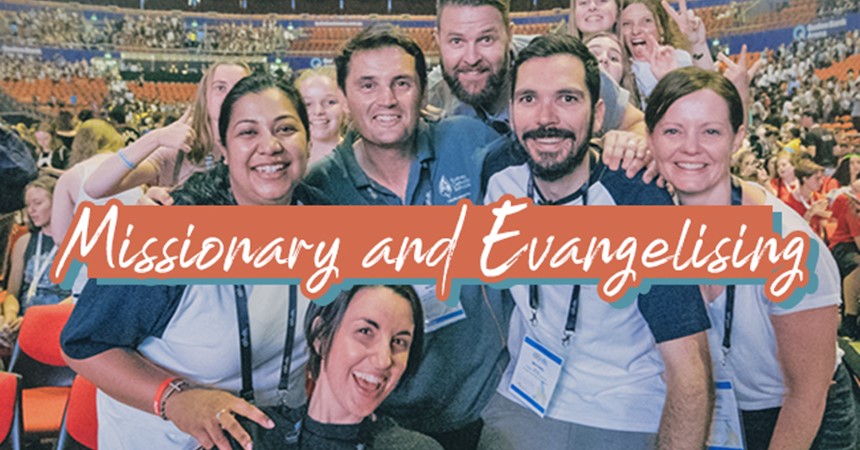The fruits of what is discerned during this time will help shape the agenda of the first session of Plenary Council in October 2020.
Each week, a snapshot report will be released by the Plenary Council Facilitation Team, showing the responses that lead to the development of each theme.
The first snapshot report centres on:
How is God calling us to be a Christ-centred Church that is missionary and evangelising?
This was inspired by the voices of the People of God who shared a passion for participating in the missionary nature of the Church and desire stronger support, involvement and formation among all the baptised who make up the Church.
The data also identified the need to reach out and communicate more effectively and to find new ways of living and proclaiming the Gospel in Australia today. There was a call for the strengthening of leadership and ministries in parishes and schools, training to equip leaders for ministry, pastoral support for various groups within parish and faith communities, and a desire for a unified voice in engaging social issues such as life and religious freedom.
What did people talk about?
People spoke about a number of different topics in phase 1: listening & dialogue. A comprehensive report on all the voices of participants will be released on July 28, 2019. Below are some of the topics that informed this particular theme, which was created through a combination of analysis, discernment and prayer.


DISCLAIMER: Colour and size of text were randomly generated for aesthetic purposes and must not be taken as data visualization. Image: Plenary Council 2020.
Below is a snapshot of responses to the question: What do you think God is asking of us in Australia at this time?
“We are asked to be Missionary Disciples to do God’s mission as we walk in the footsteps of Jesus. To encourage and lead young families, by example, to the church. To model a Catholic life in our families, school and communities. To pray often”.
“More formation & teaching needed for the Mass/Eucharist for young people”.
“How will the Good News be proclaimed? These days, most Catholics do not go to church, so do not hear any teachings from the pulpit. Therefore, the bishops must use any and all means of communication to spread the Good News – perhaps a weekly newspaper column, a blog, a ten-minute TV session once a week, and using social media (Twitter, Instagram, Facebook). Of course, the world will object, but that doesn’t matter – at least people would know where the Catholic Church stands on important issues and articles of faith”.
“I feel God is calling us to listen to each other and work together”.
“Based on the Gospel ‘that penance and remission of sins should be preached in his name, unto all nations’, that we should love our neighbour, love God and follow the commandments. My suggestions and comments on how I think we can live this out: To bring more people into the Church – stronger catechesis at schools and parishes … Greater emphasis on the sacraments. Confession is vital for people to receive the mercy of God and have their sins forgiven – as such, people need to know why confession is necessary, and more times available to access this sacrament would be helpful. People need to learn apologetics and be prepared to evangelise and also defend the faith”.
“God is asking us to be accepting of refugees and to understand and reach out to our indigenous people and those that are marginalised. God wants us to stop taking and to start giving”.
“I think that God is asking of us down here in Australia to be attentive towards Christian persecution and religious freedom, especially as our nation is becoming more secular. In relation, I also believe He is asking us to defend our faith and not be afraid to say that we are Christians”.
“Have faith that He will keep His promise to be with us. And trusting in God’s grace, the Holy Spirit given to us, to go out and make disciples for Jesus Our Lord and teach them to do the same. Humbly renew our own encounter with the mercy and compassion of God in Jesus, to be forgiven and healed, and to be set free to encounter our world with that same mercy and compassion.”
Here is a snapshot of responses to the question: What questions do you have about the future of Australia that you would like the Plenary Council to consider?
“How can the Church go about changing societal values on abortion and other life issues?”
“Are we giving enough support for parents as the primary educators of their children in the faith?”
“How can we focus more on families, welcoming them and involving them? They are the Church of tomorrow?”
“Who is evangelising the evangelisers?”
“How can the Church go about reinforcing Church teaching within our own congregations?”
“How do we get people to return to prayer when we live in such a fast paced life?”
“How do we deal with the lack of clergy available to celebrate communion at some parishes and some schools?”
“How can the Church support the faith of its school and other teachers?”
This is a snapshot of your stories of faith
Chacko – 60 years old, Adelaide
I was ordained a Priest [in] 1985 and left active ministry in 2005. I and my wife migrated to Australia for higher studies in 2005, and are well settled in life with professional jobs and active ministry participation in the Catholic faith. I would welcome the opportunity to return to the priesthood, as I come with a deeper and broader understanding of life, of the joys and struggles being experienced by the people and communities I would be serving. I have an enhanced wisdom of life prompted by the signs of the times that bring strong connections to families and communities.
Patricia – 71 years old, Brisbane
I love my Catholic faith, and live it every day. Without the Eucharist in Mass and listening to the homily, I would find life more difficult. Our western world leads many people on the wrong paths in life, and if they have no guidance from our church leaders, we will see empty pews in our churches. Especially under 55’s.
Our Catholic schools must prepare our students to be more active in the practice of their faith, and to resist the temptations that await them in the wider world. Our young people want the Church to be more inclusive of both men and women. And to realise, also, that they, the youth, have had little exposure to what the Church offers as in previous generations. Change must come.
Vincent – 23 years old, Parramatta
When I was in year 11, I went to a 14-day retreat. We had daily Holy Hours, prayed the Rosary, listened to many talks, went on street evangelisation and door knocking, observed times of silence and still managed to play games and do fun activities as well.
As a shy person, I found it challenging to talk to others and especially when I went door knocking. But everyone was so welcoming and charitable that upon reflection, I realised I’d found a pocket of hope in a world of despair. It changed my life because although I intellectually understood that God loved me, having been taught this at school, at the retreat I truly felt His love in my heart. It was the love and charity everyone had for each other and for me that touched me and helped me to see and tangibly feel God’s love for me.

